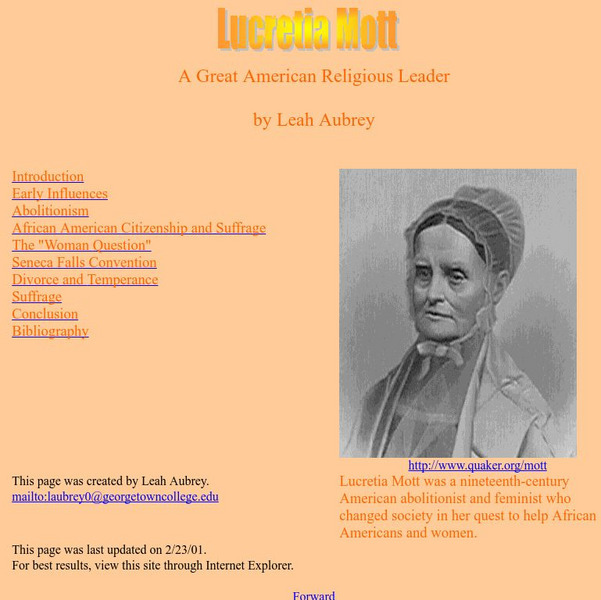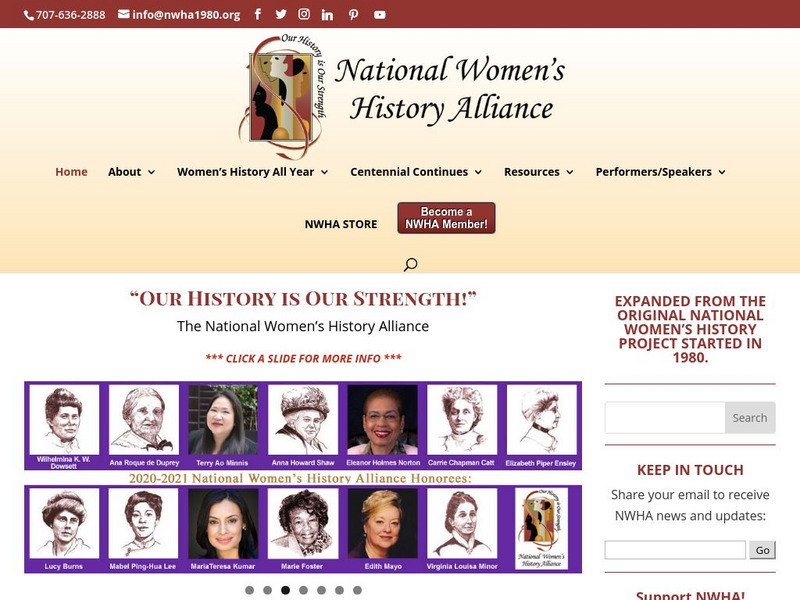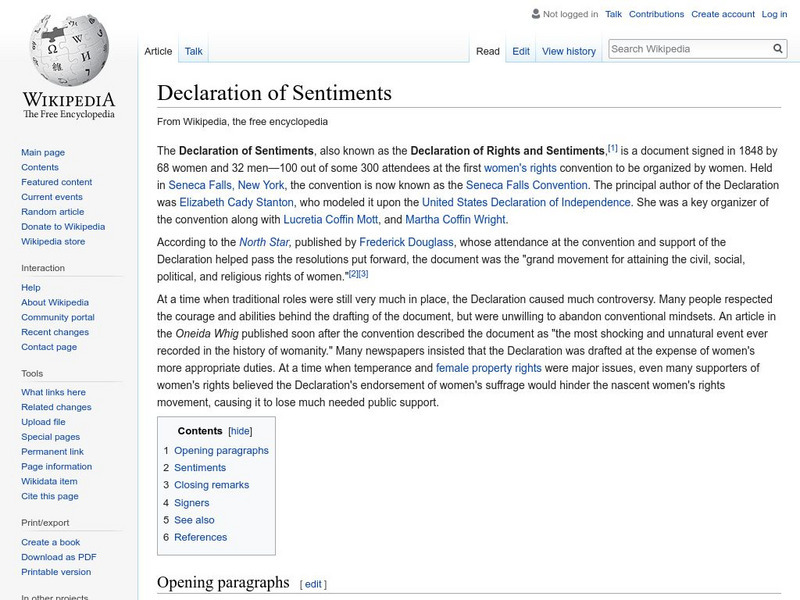Curated OER
Before Rosa Parks: Upper Grades Activity: Frances Watkins Harper
Students analyze the rhetorical strategies Frances Watkins Harper used, such as tone, emotional appeal and descriptive language
Curated OER
How Women Won the Right to Vote
Students consider how women gained the right to vote in America. In this suffrage activity, students investigate major events of the suffrage movement and conduct research. Students also role play petitioning to President Wilson to get...
Curated OER
Hall of Fame
Students create a Hall of Fame. They discuss and study established Hall of Fames such as baseball. They participate in mock nominating and voting process for the hall of fame.
Curated OER
Susan B. Anthony: Rebel for the Cause
Students explore the suffragist, Susan B. Anthony, documents her life and era with photographs, illustrations, and interviews. It demonstates how this feminist leader simultaneously influenced events and was shaped by external forces.
Curated OER
Voting and the U.S. Constitution (Past, Present, and Future), Part 2
Students analyze and discuss the 19th Amendment, and read the document, Why Women Want to Vote. Students illustrate statements from the handbill, then conduct a play about women's suffrage.
Curated OER
Powerful Signatures
Students experience famous historical documents that were initiated and propelled by signatures such as Declaration of Independence, U.S. Constitution. They create a school amendment using the information gathered.
National Women’s History Museum
National Women's History Museum: Seneca Falls Convention
Students will examine primary sources about the Seneca Falls Convention in 1848 to understand why a women's rights movement was necessary to gain greater rights for women.
Library of Congress
Loc: Seneca Falls and Building a Movement, 1776 1890
The story of the Seneca Falls convention is told through words, pictures, and primary sources.
Library of Congress
Loc: Seneca Falls Convention Scrapbook
Explore digital photographs of newspaper clippings about the Seneca Falls Convention for women's rights in 1848. Includes a photo depicting Stanton in the controversial bloomer outfit.
US Department of State
America.gov: Seneca Falls Convention Began Women's Rights Movement
Learn about the convention that not only paved the way for women's rights but also lead to women's suffrage. This article describes the political climate that motivated Elizabeth Cady Stanton, Lucretia Mott, and other proponents of...
National Women’s History Museum
National Women's History Museum: Report of the Women's Rights Convention
Complete proceedings of the 1848 Seneca Falls Convention advocating women's rights.
Smithsonian Institution
National Portrait Gallery: The Seneca Falls Convention
Short essay on the Seneca Falls Convention, illustrated with portraits of four key drivers behind the convention: Elizabeth Cady Stanton, Lucretia Mott, Frederick Douglass, and Susan B. Anthony.
National Women’s History Museum
National Women's History Museum: Seneca Falls and Suffrage
Using the Chester Comix panels, students will explore and discuss the Suffrage Movement, the purpose of the Seneca Falls Convention and the contributions to equality made by four key figures: Elizabeth Cady Stanton, Frederick Douglass
Khan Academy
Khan Academy: Us History: 1800 1848: Women's Rights and the Seneca Falls Convent
The first women's rights movement advocated equal rights for white women by leveraging abolitionist and Second Great Awakening sentiment.
National Humanities Center
National Humanities Center: Toolbox Library: Reading Guide: Elizabeth Cady Stanton: "Seneca Falls Address"
A powerful call for women's rights, particularly for suffrage, expressed in the "Declaration of Sentiments" and issued at the 1848 Seneca Falls Convention by Elizabeth Cady Stanton. Includes discussion questions.
The History Cat
The History Cat: Fight for the Nineteenth: The Fight for Women's Suffrage
Looks at the history of the movement to obtain equal rights for women, starting with the Seneca Falls Convention in 1848, up to the passage of the Nineteenth Amendment in 1920, when women won the right to vote.
Curated OER
National Park Service: Women's Rights: How Five Women Changed the World
This site introduces the Women's Rights National Historical Park. Touches on information about the Seneca Falls Convention and the signing of the Declaration of Sentiments. Hyperlinks lead to additional information.
Other
Georgetown College: Lucretia Mott: A Great American Religious Leader
This is a very in-depth, student-written biography on the life of Lucretia Mott. Read about her early influences, the Seneca Falls Convention, and her involvement with the suffrage movement.
Independence Hall Association
U.s. History: Women's Suffrage at Last
Trace the history of the women's suffrage movement from its organized beginnings in 1848 with the Seneca Falls Convention to the final success with the adoption of the 19th Amendment, which constitutionally granted women the right vote.
Other
Susan B. Anthony Center for Women's Leadership
Resources, such as a timeline of women's struggle for equality in America, on topics related to the history of women in the United States. Also find information on two nineteenth-century rights activists, Susan B. Anthony and Elizabeth...
Other
Living the Legacy: The Women's Rights Movement
The homepage of the National Women's History Project, this site includes links to suffrage history, timeline, a chat room, and student projects. Also information about the 150th anniversary of the Seneca Falls convention and national...
Wikimedia
Wikipedia: Declaration of Sentiments
This Wikipedia page provides the text of the Seneca Falls Declaration of Sentiments, a document signed in 1848 by sixty-eight women and thirty-two men, delegates to the first women's rights convention in Seneca Falls, New York.
Internet History Sourcebooks Project
Fordham University: Modern History Sourcebook: The Declaration of Sentiments
This resource gives an introduction to "The Declaration of Sentiments" from the Seneca Falls Conference in 1848, which demanded rights for women, as well as a full text accompanying it.
Curated OER
National Park Service: Elizabeth Cady Stanton
This NPS website contains a biography on Elizabeth Cady Stanton, the driving force behind the 1848 Convention and a leader in the women's rights movement.




















